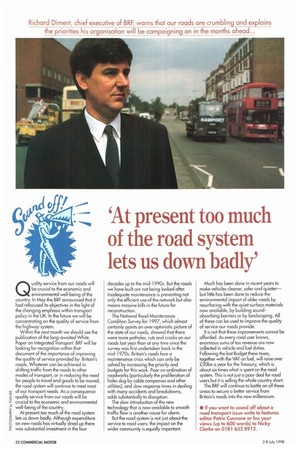Richard Diment, chief executive of BRF, warns that our roads
Page 54

If you've noticed an error in this article please click here to report it so we can fix it.
are crumbling and explains the-itiesjAsinisation will be campaigning on in the months ahead...
'At present too much of the road system lets us down badly'
Quality service from our roads will be crucial to the economic and environmental well-being of the country,. In May the BRF announced that it had refocused its objectives in the ight of the changing emphasis within transport policy in the UK. In the future we will be concentrating on the quality of service from the highway system.
Within the next month we should see the publication of the long-awaited White Paper on Integrated Transport. BRF will be looking for recognition within that document of the importance of improving the quality of service provided by Britain's roads. Whatever can be achieved in shifting traffic from the roads to other modes of transport, or in reducing the need for people to travel and goods to be moved, the road system will continue to meet most of our transport needs. As a consequence quality service from our roads will be crucial to the economic and environmental well-being of the country.
At present too much of the road system lets us down badly. Although expenditure on new roads has virtually dried up there was substantial investment in the four decades up to the mid-1990s. But the roads we have built are not being looked after. Inadequate maintenance is preventing not only the efficient use of the network but also means massive bil(s in the future for reconstruction.
The National Road Maintenance Condition Survey for 1997, which almost certainly paints an over-optimistic picture of the state of our roads, showed that there were more potholes, ruts and cracks on our roads last year than at any time since the survey was first undertaken back in the mid-1970s. Britain's roads face a maintenance crisis which can only be solved by increasing the priority and budgets for this work. Poor co-ordination of roadworks (particularly the proliferation of holes dug by cable companies and other utilities), and slow response times in dealing with many accidents and breakdowns, adds substantially to disruption. The slow introduction of the new technology that is now available to smooth traffic flow is another cause for alarm.
But the road system is not just about the service to road users: the impact on the wider community is equally important. Much has been done in recent years to make vehicles cleaner, safer and quieter— but little has been done to reduce the environmental impact of older roads by resurfacing with the quiet-surface materials now available, by building soundabsorbing barriers or by landscaping. All of these can be used to improve the quality of service our roads provide. It is not that these improvements cannot be afforded. As every road user knows, enormous sums of tax revenue are now collected in vehicle and fuel duties. Following the last Budget these taxes, together with the VAT on fuel, will raise over £30bn a year for the Treasury, which is about six times what is spent on the road system. This is not just a poor deal for road users but it is selling the whole country short. The BRF will continue to baitie on all these areas to secure a better service from Britain's roads into the new millennium.
• If you want to sound off about a road transport issue write to features editor Patric Cunnane or fax your views (up to 600 words) to Nicky Clarke on 0181 652 8912.












































































































